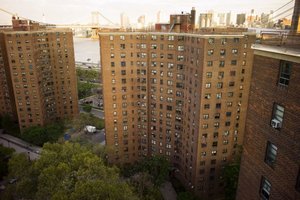Housing

More about this issue:
The AFL-CIO Housing Investment Trust (HIT) is helping to finance the $337.7 million new construction of 311 West 42nd Street, a mixed-use development comprised of 330 residential rental units, 83 of which are affordable, and 41,678 square feet of rentable retail space.
Community Boards are the most grassroots level of New York City’s government and serve an advisory role providing recommendations to the City Council and the Office of the Borough President and working with City agencies to resolve local service issues.
After ten long weeks on strike, in what became the largest labor action in the country, student workers at Columbia University have reached a tentative contract
In Governor Hochul’s State of the State this week, she signaled important steps forward on climate action that creates good union jobs, including significant investment in the offshore wind supply chain, movement toward necessary transmission upgrades, and much-needed investments in schools.
The Build Back Better agenda means trillions of dollars of investment in our jobs, families and communities.
As we look back on the past year, we're reflecting on the continuing challenges that the New York City labor movement has faced, but also on the significant ground we’ve gained and the enormous potential ahead of us.
Columbia student workers are still on strike in what is currently the largest such action in the country. Three thousand workers, including undergraduate and graduate teaching and research assistants at Columbia University, are now in the eighth week of their strike.
Student workers including undergraduate and graduate teaching and research assistants at Columbia University are wrapping up the second week of their strike, the second-largest in the country.
Today, we observe Labor Day by recognizing all working people for their contributions to our nation and giving them a chance to enjoy a well-earned rest and time with their loved ones.
The U.S. Supreme Court has struck down both the New York State and CDC Eviction Moratoriums. This means that tenants who filed hardship declarations are no longer protected and landlords can now ask the court for the necessary permission needed to evict.
